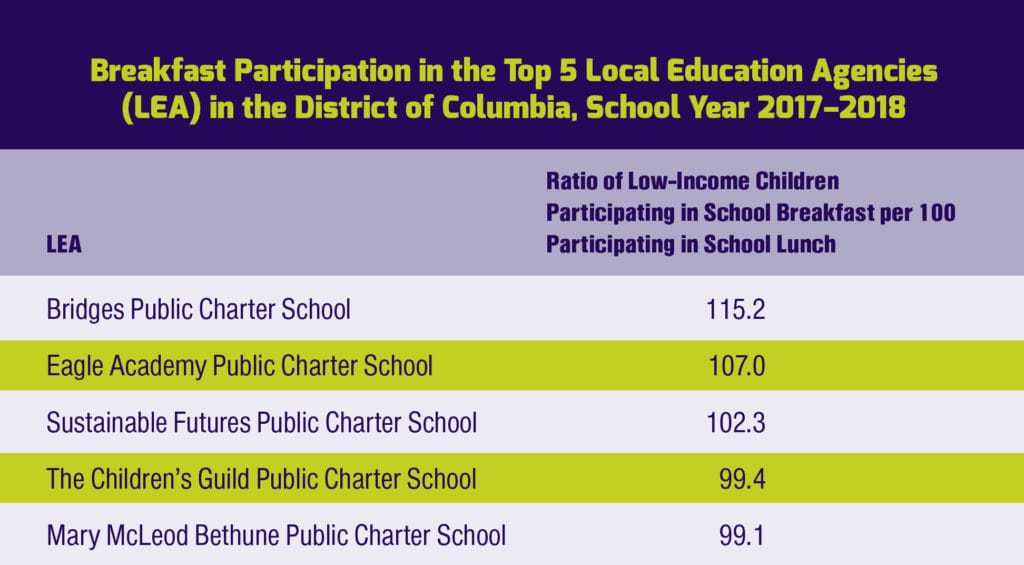District’s Shortcomings in School Breakfast Put Health and Learning of D.C. Children at Risk
Media Contact:
Emily Pickren
epickren@frac.org
202-640-1118
WASHINGTON, April 23, 2019 — D.C. Hunger Solutions is calling on the D.C. Council to prioritize funding for the Healthy Students Amendment Act in the fiscal year 2020 budget bill to ensure more low-income children stave off hunger and start their day ready to learn. By targeting District funds to supplement federal nutrition funds in supporting innovative and high quality breakfast programs, the Act would provide major benefits to the District’s schools and children.
Just over 30,000 low-income students in the nation’s capital participated in school breakfast on an average school day in the 2017-18 school year, compared to the nearly 43,550 students who participated in school lunch, according to the anti-hunger organization’s D.C. School Breakfast Scorecard, released today. The Scorecard finds that school breakfast participation has seen a decrease over the last four years.
“School breakfast reduces hunger, helps families in the District stretch their food budgets, boosts academic performance and even minimizes visits to the school nurse,” said Beverley Wheeler, director, D.C. Hunger Solutions. “The D.C. Council and the Office of the State Superintendent for Education must ensure that the Healthy Students Amendment Act is fully funded, promoted, and implemented to support better health and academic outcomes for children across the district.”
Only 28 of the 61 Local Education Agencies (LEAs, or school districts) included in the Scorecard met D.C. Hunger Solution’s goal of reaching 70 low-income children with school breakfast for every 100 participating in school lunch during the 2017-2018 school year. (Individual charter schools or clusters of such schools are separate LEAs in the District). District of Columbia Public Schools – by far the District’s largest LEA – was not one of the 28. The top five LEAs reached 99 or more low-income children with school breakfast for every 100 who participated in school lunch.

Districtwide, 69.1 low-income students ate school breakfast for every 100 who received school lunch; making this the fourth year in a row that D.C. has not met the 70-to-100 goal.
Twenty-three LEAs failed to serve school breakfast to even half of the low-income students who participated in school lunch in the 2017-2018 school year. The low participation in these LEAs indicates that many schools are likely no longer in compliance with the D.C. Healthy Schools Act of 2010, which requires all D.C. public schools – both traditional and charter – to offer breakfast at no charge to all students, and high-poverty schools to adopt breakfast after the bell service models, such as breakfast in the classroom.
Similar to the Healthy Students Act, the Healthy Students Amendment Act requires all schools in the district with at least 40 percent of students eligible for free and reduced-price meals to offer breakfast after the school day starts to attract more students. It also creates a new annual subsidy of $2 per student to assist schools in implementing breakfast after the bell programs, improves nutrition standards, and increases reimbursement for meals that meet these higher standards.
“With new funding for breakfast after the bell programs, schools will be able to make breakfast part of the regular school day, ensuring more children get the nutrition they need to learn and thrive in the classroom,” said Wheeler.
###
D.C. Hunger Solutions, an initiative of the Food Research & Action Center, works to end hunger in the nation’s capital and improve the nutrition, health, economic security, and well-being of low-income District residents.
